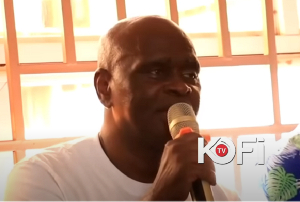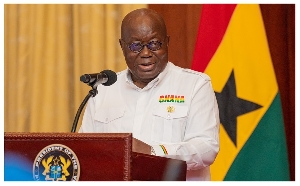- Home - News
- TWI News | TV
- Polls
- Year In Review
- News Archive
- Crime & Punishment
- Politics
- Regional
- Editorial
- Health
- Ghanaians Abroad
- Tabloid
- Africa
- Religion
- Election 2020
- Coronavirus
- News Videos | TV
- Photo Archives
- News Headlines
- Press Release
General News of Sunday, 7 July 2002
Source: gna
Health Ministry signs agreement with Health Partners
The Ministry of Health (MOH) would solicit for 400 million dollars to enable it implement a number of projects in the sector, as part of its five year programme of work. The programme, which started this year, would end in 2006 and had so far, received pledges totalling 285 million dollars from development partners.
The World Bank promised to donate 75 million dollars while the World Health Organisation would release 15 million dollars and DANIDA said it would make available 38 million dollars.
The following outfits have also made pledges: UNICEF 20 million dollars, GAVI, in-charge of an international expanded project for immunisation, 16.3 million dollars, Department For International Development 71.5 million dollars, the Royal Netherlands Embassy, 75 million Euros and Global Alliance for AIDS, 15 million dollars.
This came to light when the MOH signed an agreement with its development partners at the end of a three-day joint business meeting that discussed the 2001 review report and the second Five Year Programme of Work. The agreement would be the basis from which agencies and development partners would derive directions for drawing their plans and programmes over the five-year period.
Projects to be implemented under the programme would include service delivery, HIV/AIDS, Tuberculosis control, Malaria, finance and economics, health insurance and exemption scheme, human resource development and procurement.
Dr. Kwaku Afriyie, Minister of Health signed for the government of Ghana while Mr. Ole Blicher-Olsen, Ambassador of the Royal Danish Embassy and Chairman of European Union, signed on behalf of the partners. Development partners reviewed previous projects and made recommendations.
The agreement took into consideration challenges that continued to face the sector and saw the need to ensure that policy of integration of services and programmes did not adversely affect priority interventions.
The agreement also noted that financing of the health sector was below expectation and had been compounded by problems with disbursement, while there was brain drain and strategies for attracting and retaining staff remained on the drawing board.
It said there was the need to incorporate funds from the Highly Indebted Poor Countries (HIPC) and to accept global initiatives, adding that the MOH should provide by the middle of July, a write-up on a proposed resource envelope. The agreement said the MOH should also take into consideration the allocation to the health sector by the government of Ghana and the capital budget among other things.
Keeping these deadlines would be necessary for completing the new phases of support from DANIDA, DFID and the World Bank to ensure the uninterrupted funding of the projects' it added. Dr. Afriyie who chaired the three-day session congratulated the partners for their contribution to the development of the five-year programme, which was under the theme "Bridging the Inequalities Gap".
Mr. Ole Blicher-Olsen said Ghana was one of the best performing countries in sub-Saharan Africa and expressed the need to maintain the high performance exhibited during the first five years. He stressed the preparedness of the development partners to support work and action in the health sector and other areas of development.
Entertainment









